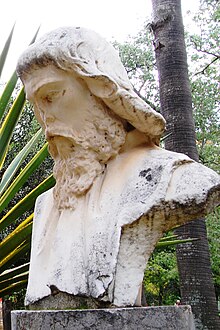music.wikisort.org - Poet
Cielo d'Alcamo (Italian pronunciation: [ˈtʃɛːlo ˈdalkamo]; also spelled Ciullo) was an Italian poet, born in the early 13th century. He is considered one of the fathers of Italian medieval jester poetry. His traditional surname (which would mean "from Alcamo", a town in northwestern Sicily) has been differently identified by other scholars as Dalcamo. (The modern form of the name "Cielo" is "Michele" or "Michael".) Cielo d'Alcamo and fellow 13th century poet Giacomo da Lentini are credited as the inventors of the love sonnet.

Villa Giulia (Palermo)
D'Alcamo is known exclusively from the poem "Rosa Fresca Aulentissima" ("Fresh and Very Perfumed Rose"), which contained in a single codex now in the Vatican Library. This work is written in a southern Italian language, with several continental influences: it represents a parody of the themes of the contemporary Troubador poetry of Provence, as well as of the language used in the "Magna Curia" of literates and scholars at the court of Emperor Frederick II at the time. The date of execution has been assigned between 1231[1] and 1250.
Identified by some scholars (such as Francesco De Sanctis) as a popular work, "Rosa fresca aulentissima" was most likely written by an acculturated author, as testified by his knowledge of works such as the Roman de la Rose and by his likely vicinity to Frederick II's court.
See also
- Sicilian School
References
- This date has been set as the poem (verses 21-25) mentions the augustari, a coin introduced in the Kingdom of Sicily in 1231.
Sources
- Alio, Jacqueline (2018). Queens of Sicily 1061-1266. Trinacria. pp. 549–562.
- Contini, Gianfranco (1960). Poeti del Duecento. Vol. I. Milan-Naples: Ricciardi. pp. 177–185.
- Mazzuchelli, Giammaria (1753). Gli scrittori d' Italia cioè notizie storiche, e critiche intorno alle vite, e agli scritti dei litterati italiani (in Italian). Bossini. p. 352.
- Mendola, Louis (2015). Sicily's Rebellion against King Charles (includes poem of Cielo d'Alcamo in Sicilian and English), ISBN 9781943639038.
На других языках
- [en] Cielo d'Alcamo
[es] Cielo d'Alcamo
Cielo d'Alcamo fue un poeta italiano, nacido presumiblemente en Alcamo, Sicilia,[1] en la primera mitad del siglo XIII. Es uno de los poetas más representativos de la poesía popular juglaresca y de la Escuela siciliana.[fr] Cielo d'Alcamo
Cielo d'Alcamo est un écrivain sicilien du XIIIe siècle. Son texte le plus connu est le Contrasto (Rosa fresca aulentissima...), qui est une parodie de l'amour courtois de l'époque. Sa forme métrique très particulière s'inspire peut-être de la poésie arabo-andalouse circulant encore à son époque[1].Другой контент может иметь иную лицензию. Перед использованием материалов сайта WikiSort.org внимательно изучите правила лицензирования конкретных элементов наполнения сайта.
WikiSort.org - проект по пересортировке и дополнению контента Википедии